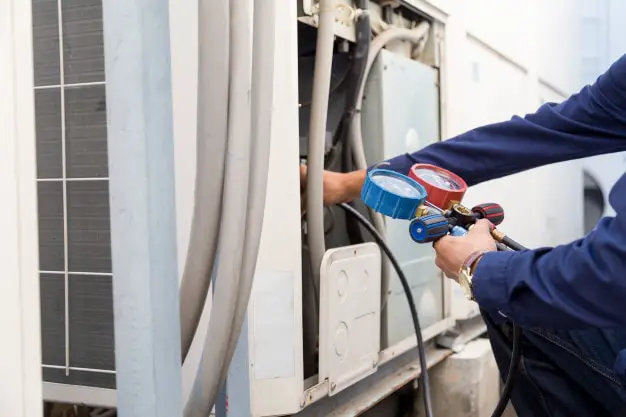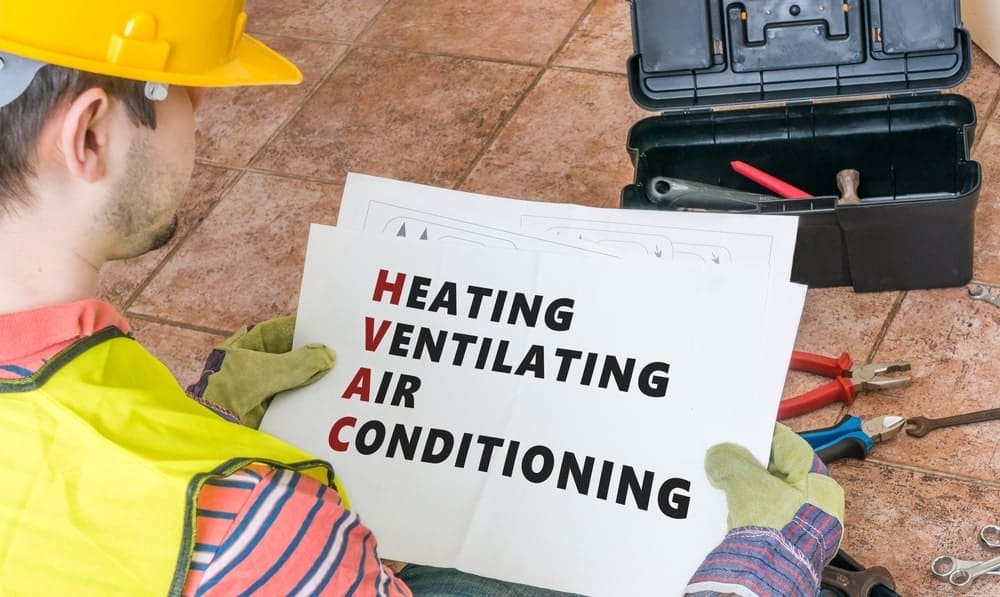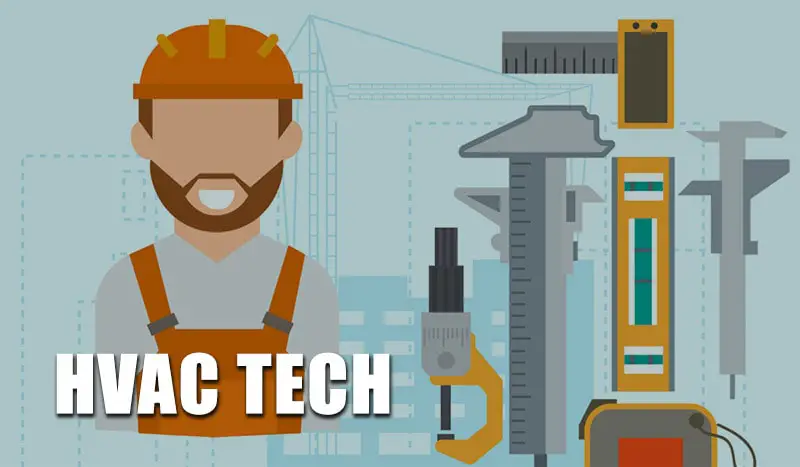If you enjoy working with your hands, thinking critically, and solving problems, then a career in HVAC may be a perfect fit for you! There is high demand for skilled HVAC technicians worldwide, which is likely to increase by 15% from 2016 to 2026.
This is faster than the typical growth for all occupations.
If the information above has piqued your interest in HVAC, then continue to our comprehensive overview of HVAC degrees below.

What is an HVAC Degree?
An HVAC (heating, ventilation, and air conditioning) degree certifies technicians in installing, maintaining, diagnosing, and repairing air conditioning and heating systems in both suburban and industrial buildings.
An HVAC Degree is generally completed at a community college or trade school and takes roughly two years to complete. However, some institutions offer programs that you can complete at an accelerated rate.
An HVAC degree program teaches technicians the basic knowledge required to work in the HVAC industry, such as HVAC system mechanics, electrical work, and taking the necessary safety precautions.
Types of Degrees for HVAC
Before enrolling in an HVAC degree program, it’s important to know which program might be best suited to you! Below, we look at a few of the many different HVAC degrees you can choose from.
Certificates and Diplomas
These programs generally cover the basics of heating and air conditioning systems, such as the purpose of different components, how to work with a variety of repair tools, and how to install standard HVAC systems.

Associate Degrees
While an HVAC certificate or diploma can guide students through the field’s basics, HVAC associate degree programs usually present their students with a more well-rounded sense of information.
Students often enroll in courses in separate fields, which can aid in improving their occupational awareness.
For instance, a student who takes business courses within their associate degree program may understand helpful client interaction procedures and learn how to make payments, as well as bill clients.
What Can I Do With an HVAC Degree?
It’s recommended that you consider what you might want to do in the HVAC field before choosing to spend your money and time investing in an HVAC degree/certification. There are various careers in the field to choose from, so consider your options carefully.
To make the decision process a little easier for you, here are a couple of popular HVAC careers along with their requirements.

HVAC Installers
HVAC installers focus their efforts on installing new systems into various premises. Installers ensure that the buildings have the correct support and electrical components in place before beginning the installation process.
HVAC installers will then install or build new HVAC systems that control the building’s temperature and maintain comfort. Most HVAC installation technicians complete a postsecondary certificate or an associate degree program and often complete an internship too.
Maintenance and General Repair Technicians
Maintenance and repair technicians perform maintenance and repairs around homes and various other buildings. This often entails assembling machinery and equipment, replacing faulty circuit breakers, outlets, switches, and conducting repair work using diagrams and blueprints.
Pros of Having an HVAC Degree
There are many notable pros to acquiring an HVAC degree, as opposed to any other HVAC qualification, such as:
HVAC Work is Never Outsourced
When heating and cooling systems are being installed or fixed, an educated professional must be on-site during the process. When you’re well-trained to complete the task, you’re more likely to get the job.
Higher Earning Potential
Often, organizations will pay more for technicians with a higher HVAC certification, such as a degree, than those who hold a certificate or a diploma. The higher your qualification, the more likely you are to receive higher pay!
You Can Work Almost Anywhere Within the World
Most people use heating, ventilation, air conditioning utilities daily, which has made for the growing demand for certified HVAC technicians worldwide. This will allow you to live and work almost anywhere you choose.
Alternatives to an HVAC Degree
Below we take a look at the alternatives to obtaining an HVAC degree.

Degree vs Certificate
One of the alternative routes you could take to pursuing a degree is enrolling in an HVAC certificate program. There are many types of certificate programs that most HVAC specialists complete before joining the workforce.
Typical certifications include the NATE certification, EPA Section 608 Technician Certification, and the HVAC Excellence certification. These institutions offer several certification varieties that are particular to an individual’s work expertise and HVAC fundamentals knowledge.
HVAC Degree vs Apprenticeship
Another alternative to an HVAC degree is pursuing an HVAC apprenticeship. Sometimes, apprenticeships are divided into various levels, and participants are placed according to their existing abilities.
The job of an HVAC apprentice often requires the operation of multiple types of machinery and working beneath a senior-level employee.
How Do You Choose a Good HVAC College?
When considering the money and time you’ll invest in a good HVAC college, it’s worth thoroughly investigating the various options available to you. Below we look at a few essential attributes of a reputable HVAC college.

A Good History and Reputation
Is the school well known? Do you know of anyone who has taken a course there? Are you able to find reviews about the HVAC program/s they offer? When was the institution established?
Ensure that you do a good amount of research into the schools/institutions you are considering enrolling in. Unfortunately, the cheapest HVAC course often isn’t the most trustworthy choice, so it’s best not to decide based solely on the program’s price.
Training in a Real-life Work Environment
Knowing HVAC theory won’t be enough to land your ideal career in the field. Employers will be looking for workers who have a real understanding of HVAC systems and how to construct them.
Your Instructor Has a Background in the Field
You want an instructor who’s worked in HVAC and who has actual knowledge of the trade. An authentic HVAC expert will instruct you on what to expect on a job site. They know exactly which employers are considering new technicians.
In conclusion, ensure that you choose a program and institution that is well suited for the type of HVAC career you’re looking to lead. With all the possibilities that working as an HVAC tech brings, it’s undoubtedly a career field worth considering!
With a lot of hard work and a great deal of determination, you’ll be able to work as a top-class technician in no time.

Conclusion
Obtaining an HVAC degree can be challenging, but it’s achievable. You’ll be able to pursue several careers in the industry, even open your own business. We hope our guide has shown you how to select the correct college and decide where to complete the course.
People Also Ask
You may have some queries relating to HVAC degrees that we haven’t covered yet. Here are some aspects to look at which may assist. Below, we provide a brief overview of a few of the common questions about HVAC careers.
Yes. As an HVAC technician, you’ll be able to make good money, which is one of the many reasons people go into the field. The average base pay for an HVAC technician is $52,433 a year.
The cost of the degree is dependent on the program you choose to enroll in. An associate’s degree, for example, takes two years to complete and can cost anywhere from $15,000 to $35,000.
Absolutely! The HVAC field is so diverse that a technician, especially one new to the field, can’t afford to narrow their abilities and expertise. Possessing a broader knowledge will grant you access to more niches and markets, which will offer the possibility of earning more.
HVAC technicians require math to calculate the proper load requirements to guarantee that equipment heats or cools appropriately. A technician will often need to plan or design various parts of an HVAC system, which will usually require a sketch of the building or the room they are working in.
This means that technicians will be working with angles, lines, squares, circles, rectangles, and other shapes.
